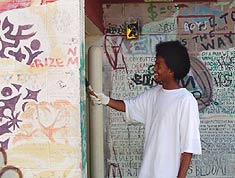Berkeleyan
A mutually beneficial partnership
Campus offers work experience to city youth, who benefit from that exposure (and get paid too)
![]()
| 02 September 2004
 This Berkeley citizen spent some of his Youthworks hours effacing graffiti from the walls in People’s Park. (Doreen Moreno photo) |
Since 1989, YouthWorks has provided summer employment opportunities for Berkeley residents ages 16 to 21. The city of Berkeley recruits students, processes their applications, and prescreens those who qualify based on the requirements campus units submit. Once preliminary matches are made, students are sent to interview for the positions.
UC Berkeley’s Office of Community Relations manages the summer program, recruiting campus supervisors interested in employing YouthWorks students. The youth are often “highly motivated,” says Doreen Moreno, Projects and Outreach Manager for Community Relations. “YouthWorks benefits the campus by providing cost-effective summer help from young people from our local community who are talented and energetic, and who take pride in the quality of their work,” says Moreno.
“The program offers an opportunity for our children to become familiar with the inner workings of the university and its vast resources,” says the city’s Youth-Works coordinator, Juanita McMullen. “That’s a huge community payoff that UC Berkeley offers the city.”
Meg Garstang, a senior analyst in Associate Vice Chancellor Ron Coley’s office, has employed a YouthWorks student for the past five summers and sees the relationship as mutually beneficial.
“We get excellent work out of these students, because we invest in a very coherent training program for them,” says Garstang. She creates meaningful summer experiences for her workers, because “working as an office assistant is not the career goal” of many YouthWorks employees. Garstang sees the program as a way to “provide students with a set of skills that will let them support themselves through their academic careers.”
As an example, Garstang relates the story of Monique Le, who blossomed during the three summers she worked for Business and Administrative Services. “When Monique came to us,” says Garstang, “she wasn’t sure she wanted to go to college. She had never worked in an office and knew nothing about computers.”
By the time Le completed her third summer in YouthWorks, she was doing what Garstang calls “AAII-level work,” had graduated from Berkeley High School, and had been accepted at UC Irvine. As a freshman, Garstang notes not without pride, Le was hired by Irvine’s Office of the Dean of Biological Science to fill “a very competitive [administrative] position.”
McMullen, the Berkeley coordinator who has been involved with the program since its inception, says that YouthWorks provides its young participants with different benefits depending upon their individual needs.
“All of our children are not college-bound,” says McMullen. “A big part of our mission with this program is to demystify the world of work.”
JeNell Padilla, a manager in the Office of Student Development, has had a long history supervising YouthWorks staff. “It’s always gratifying to be one additional voice helping to guide a young person who may have an idea of what he or she wants to do but doesn’t yet know how to get there,” she says.
“We recognize that we’re part of a university that’s part of a community,” Padilla continues. “That means we’re responsible for maintaining a healthy, mutually beneficial relationship with the community. This program is a way we can do that.”

